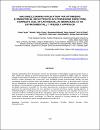MACHINE LEARNING APPLICATION FOR OPTIMIZING ASYMMETRICAL REDUCTION OF ACETOPHENONE EMPLOYING COMPLETE CELL OF LACTOBACILLUS SENMAIZUKE AS AN ENVIRONMENTALLY FRIENDLY APPROACH

View/
Date
2020-02-01Author
Taylan, OsmanYilmaz, Mustafa Tahsin
Balubaid, Mohammed
Alamoudi, Rami
El-Obeid, Tahra
Dertli, Enes
Şahin, Engin
Bakhsh, Ahmed
Herrera-Viedma, Enrique
...show more authors ...show less authors
Metadata
Show full item recordAbstract
Recently, optimization of the bioreduction reactions by optimization methodologies has gained special interest as these reactions are affected by several extrinsic factors that should be optimized for higher yields. An important example for these kinds of reactions is the complete cell implications for the bioreduction of prochiral ketones in which the culture parameters play crucial roles. Such biocatalysts provide environmentally friendly and clean methodology to perform reactions under mild conditions with high conversion rates. In the present work, at the first step the Lactobacillus senmaizuke was isolated from sourdough and the complete cell application of Lactobacillus senmaizuke for the bioreduction of acetophenone was optimized by an Artificial Neural networks (ANNs) to achieve the highest enantiomeric excess (EE, %). The culture parameters, pH, temperature, incubation period and agitation speed were the experimental factors that were optimized to maximize EE (%) by machine learning algorithm of Artificial Intelligence modeling and the best conditions to maximize EE (95.5 %) were calculated to be pH of 5.7, temperature of 35 ºC, incubation period of 76 h and agitation speed of 240 rpm with very low sum of squared error value (0.611236 %) to bioreduce acetophenone using complete cell of Lactobacillus senmaizuke as a sourdough isolate GRAS microbial species. Accordingly, The ANN was employed to correctly establish the enantiomeric excess values of the specimen with an average absolute error 0.080739 %.
Collections
- Human Nutrition [429 items ]

